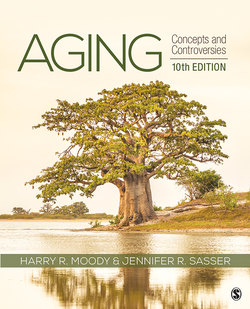Читать книгу Aging - Harry R. Moody - Страница 86
На сайте Литреса книга снята с продажи.
Compression or Prolongation of Morbidity?
ОглавлениеBiology has not yet succeeded in unraveling the mystery of aging, so it is not surprising that medical science has produced no technology or method for raising the maximum life span of human beings. Caloric reduction and genetic methods have worked with lower organisms, but human beings are more complex organisms, and the research studying humans has yet to provide conclusive evidence on this point. To extend life expectancy and promote healthy aging, we may need to identify genes responsible for harmful mutations, whether expressed early or late in life. A parallel approach would be to identify those environmental agents (e.g., diet, sunshine, smoking) that have a cumulative impact on sickness and survival. Health promotion might then succeed in postponing chronic illness, thereby making the idea of the one-horse shay more possible.
Progress in these directions depends on answering the question of why we age. In the reading titled “Why Do We Live as Long as We Do?” Leonard Hayflick highlights some basic facts about the biology of aging that are relevant to our hopes for compressing or extending our longevity.
In the other readings that follow, we hear different voices in the compression-of-morbidity debate. On one side, James F. Fries and Lawrence Crapo take the optimistic position that improving life expectancy will also lead to compressed morbidity: People will live longer and not be sick until the very end of their natural life span. Fries and Crapo believe that successful aging involves optimizing life expectancy while reducing physical, psychological, and social morbidity. Their “sunny” view of aging is paradoxical, in a way, because it presumes that the maximum life span remains fixed, a limitation other biologists might reject. In support of their view, we can note that some postponement of morbidity has already occurred: Declining death rates from heart disease and stroke reflect improvements in health due to lifestyle, diet, hypertension detection, and so on.
But not everyone is persuaded by Fries and Crapo’s interpretation of the evidence on morbidity and death rates. Researchers and demographers disagree about whether compression of morbidity is occurring and whether maximum human life span is really finite, as Fries believes. Vincent Mor notes that, although it seems that morbidity rates and functional decline have decreased in the industrialized world, because of population aging, there will be more older people than ever before suffering from chronic and disabling health conditions. Still other conditions, such as depression and sensory losses, are not linked to causes of improved life expectancy at all, so we remain haunted by the fear that longer life might mean only prolongation of morbidity (Olshansky, Carnes, & Cassel, 1990; Verbrugge, Lepkowski, & Imanaka, 1989).
Finally, as we look further into the 21st century, we might consider possibilities beyond the range of current science and medicine. In visionary terms, biologist Aubrey de Grey believes, contrary to most gerontologists, that aging is a disease, a condition to be “cured.” Some scientists argue that if we began to accept the idea that aging is a disease, it could dramatically alter the way we think about getting old (Adam, 2019; Sinclair, 2019). Some technologists active in Silicon Valley take the view that now is the time to prepare for living indefinitely (Regalado, 2019).
S. Jay Olshansky, by contrast, reminds us that a “cure for aging” is a fantasy that has deluded seekers for biological immortality down through the ages. Olshansky favors research on the biology of aging, but he distrusts any claim that raising the maximum life span is right around the corner.
The debate over why we grow old shows that scientific “facts” are rarely as simple as we imagine. The meaning of the facts depends on our theories and interpretations, and our own hopes about the aging experience, and it is therefore subject to debate and construction in different ways. Different views of the facts about illness and survival in old age today are leading us to new ways of thinking about mortality and morbidity among older adults. Indeed, the debate about compression of morbidity is rooted in biology, but it has implications for health care economics in an aging society as well as how individuals experience later life. What can we expect in the future if medical technology succeeds in prolonging life still more? How much emphasis should we give to health promotion as opposed to curing diseases in old age? Whatever our view, the compression-of-morbidity theory stands out as an important reminder of how critical biological research will be for the future of an aging society.
